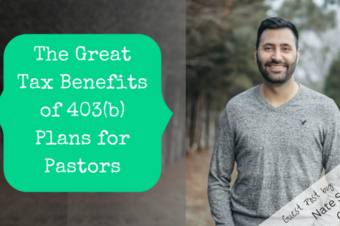
The internet is plastered with articles discussing the merits of Roth versus traditional accounts. The Pastor’s Wallet even has one for IRAs. They talk about the different taxation, time horizons, and how to pick the right kind of retirement plan for you. If you’re a pastor, though, you should ignore them all.
If you’re a pastor, you should invest in a traditional 403(b) (if it’s a 403(b)(9), which is the type that churches sponsor). At least some, if not all, of your retirement money should be going into a traditional 403(b), not a Roth 403(b). It doesn’t really matter what your personal details are. If your church or denomination offers a 403(b), it is a waste for you to put all of your money into a Roth account.
The Difference Between Roth & Traditional Accounts
Before I tell you why I’m taking such a bold and non-personalized stance, let me give you some background. The major difference between traditional and Roth accounts is the taxation.
With a Roth account, you pay taxes on the money before you put it in. Then, everything you withdraw is tax-free. With a traditional account, you invest the money before paying taxes, but then you pay income taxes on all of your withdrawals. The difference is whether you pay the taxes on the money now or in retirement.
Why Traditional 403(b)s Are Better For Pastors
What makes pastors unique in the Roth versus traditional debate is the clergy housing allowance. Ministers have a special privilege where they can pay for all of their housing expenses tax-free. And it’s not just for while you’re in active ministry. You can claim a housing allowance in retirement, too, if you have a church-sponsored retirement plan. Like a 403(b)(9).
This means that in retirement, the housing allowance will allow you to take distributions from your 403(b) completely tax-free for housing expenses. If the housing allowance makes it possible to take money out tax-free, then having a Roth is irrelevant. Why would you pay taxes on the money before investing it if you were going to be able to take it out tax-free either way?
Let’s say you have $1,000 to invest for retirement and you’re in a 10% tax bracket. With a Roth, you would pay your $100 tax and then put the remaining $900 into your retirement savings account. Then, in retirement, you can take withdrawals from the account without paying any taxes.
If you were using a traditional 403(b), you would put the entire $1,000 into the account without paying any taxes on it. Then, in retirement, anything you took out for qualified housing expenses would be tax-free. You would still have to pay taxes on the money if it were used for other things.
How much of a difference does paying that $100 in taxes make? Let’s say you leave the money invested for 30 years and earn 8% interest on it. Your Roth account, where you only invested $900, grows to $9,056. That’s pretty impressive. But, your traditional account, where you put in the entire $1,000, grows to $10,062. That’s even more impressive. That’s over $1,000 difference, and the more you invest, the bigger the difference is.
How To Determine The Best Way To Invest For Retirement
As you can see, it doesn’t make any sense to put money that will be used for housing expenses into a Roth account. However, not all of your expenses in retirement will be for housing.
You could make a case for saving some in a Roth account for living expenses and saving some in a traditional account for housing expenses. There’s nothing wrong with that. Or you could use Social Security and your IRAs or other savings to pay for living expenses and your 403(b) for housing. That works too.
Take a look at your current tax return. After the housing allowance and deductions, how much of your everyday living expenses are you paying taxes on? Based on your spending, how much of your 403(b) do you think will end up being taxable in retirement after all of the deductions?
It’s important to remember, though, that you can only take a housing allowance in retirement from a church or denominational retirement plan. You cannot take one from your IRA (even if it contains funds rolled over from a church account) or a 401(k) from a secular employer. You can read more about that here.
As you strategize for your retirement, just remember this: If you have access to a church or denominational traditional 403(b), put the money that will go towards housing expenses there. Putting it anywhere else will cause you to waste money paying unnecessary taxes.




13 Responses
Lisa
October 29, 2019One thing to note, the housing benefit does not carry over to the spouse. This benefit ends when the spouse that is designated as a minister dies. It may be smart to have both types of funds to give some tax protection to a surviving spouse.
Amy
October 29, 2019That is true, Lisa. Even if the spouse is a licensed minister, he or she will not be able to take a housing allowance from their spouse’s retirement account, only one in their own name.
David Cline
December 7, 2019If one has a larger 403b account so that each year you are taking what you can for housing and also an amount to cover annual budget wouldn’t it make sense to convert some of that 403b to a roth? Not only would there be less tax in the future for a spouse but for those who might inherit? Wondering about this. So, if one can convert so that the tax on the Roth is up to 15%….wouldn’t that be a better deal going forward as taxes are sure to rise and later income would be more. (in our case).
Amy
December 9, 2019David,
I can’t predict what will happen with taxes in the future, but your premise is correct. The Roth is only irrelevant for those funds that will be used for qualified housing expenses. Depending on your situation, it might make sense to convert some of your funds to a Roth in order to have tax-free distributions in the future.
Mark Organ
September 30, 2020Hi Amy, any recommendations for a good plan provider?
Amy
October 3, 2020Mark, I don’t have any recommendations as I am not personally familiar with any of them.
Jeff
February 1, 2021Amy,
Thank you for this article; it’s among the most detailed and helpful things I’ve read on the subject. It’s early 2021 and I just found the article, but it’s timely for me right now. My wife and I are now debt-free but for our house and I am on the hunt for information about the best way to be investing money for retirement. Everywhere you look seems to say Roth, but you’ve caused me to realize that answer is too easy and not nuanced enough for those of who are clergy. I may try to get in touch with you personally with more of my questions. Thanks again.
Amy
February 2, 2021Jeff, congratulations on being debt free except for your house! Feel free to email me at Amy@pastorswallet.com.
Greg
February 23, 2021Amy,
I’m currently learning about 403(b)(9) plans. Our church currently has a 401(k) and we are considering switching to a 403(b)(9) plan.
From my learning so far, I believe that the pastor/minister housing allowance only applies to 403(b)(9) plans, not all generic 403(b) plans.
Thanks for confirming my understanding.
Greg
Amy
February 25, 2021You’re welcome Greg. While a case could be made for other types of retirement plans, the 403(b)(9) is the one that the IRS has provided guidance on, so it is the safest option.
Bokman
November 3, 2021Hi!
Thanks for helpful posting.
I have a question about if ther is a way for pastors with no affliation to a denominiaton to get a 403(b) plan.
Thanks in advance.
Amy
November 5, 2021Bokman, yes, nondenominational churches are able to sponsor 403(b) plans. You can contact any 403(b) plan sponsor and they should be able to help you.
Filip
September 7, 2022Hey Amy! Thanks for this article. I have a 401k in our denomination only and the option for a Roth 401k. I decided to do a Roth recently because my wife is a resident physician and we will be in a higher tax bracket once she begins working in a few years, so we will have access to this only for those years as I understand the policy. What do you think?